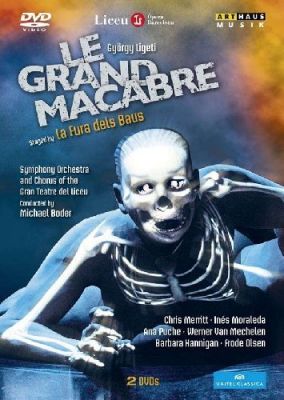LIGETI Le Grand Macabre
The London-Brussels-Rome Macabre here from Barcelona
View record and artist detailsRecord and Artist Details
Composer or Director: György Ligeti
Genre:
Opera
Label: Arthaus Musik
Magazine Review Date: 01/2013
Media Format: Digital Versatile Disc
Media Runtime: 122
Mastering:
DDD
Catalogue Number: 101 643

Tracks:
| Composition | Artist Credit |
|---|---|
| (Le) Grand Macabre |
György Ligeti, Composer
Ana Puche, Amanda, Soprano Barbara Hannigan, Gepopo, Soprano Barbara Hannigan, Venus, Soprano Brian Asawa, Prince Go-Go, Countertenor Chris Merritt, Piet the Pot, Tenor Francisco Vas, White Minister, Speaker Frode Olsen, Astradamors, Bass György Ligeti, Composer Inés Moraleda, Amando, Mezzo soprano Liceu Grand Theatre Chorus Liceu Grand Theatre Symphony Orchestra Michael Boder, Conductor Ning Liang, Mescalina, Mezzo soprano Simon Butteriss, Black Minister, Speaker Werner van Mechelen, Nekrotzar, Baritone |
Author: Mike Ashman
Performed here, as is now regular, in the composer’s substantial 1996 revision, this Barcelona production by the Catalan theatre collective La Fura dels Baus was seen at English National Opera in autumn 2009 and has also visited Brussels and Rome. For the sake of the work, I am glad it was a success – but it is revealing that it pleased conservative critics who then took out what spleen they had about the drama’s scatology and comedy on Ligeti and his co-librettist Michael Meschke rather than on Àlex Ollé and Valentina Carrasco’s reinventing-the-wheel style of production.
Because, frankly, all the subtlety, darkness and danger of the opera is swamped beneath La Fura’s now habitual parade of large statues, projections and relentless forestage street-theatre acrobatics. If the work had been staged in the 1950s there would have been a large standing set unrelated to what the actors did. Here there is a large standing fibreglass woman. The cast does actually climb in, over and out of it (using, of course, her more sexual parts) and the statue moves, but it has little to do with the drama of the piece or the production.
An international cast, chosen with the Liceu’s normal skill, sing well and act to perfection the broad, superficial style that the directors require. Michael Boder and his orchestra seem to have the piece well sorted out. But there’s too little feel in the production of an ensemble working together or of serious character investigation. A disappointment.
Explore the world’s largest classical music catalogue on Apple Music Classical.
Included with an Apple Music subscription. Download now.

Gramophone Digital Club
- Digital Edition
- Digital Archive
- Reviews Database
- Events & Offers
From £9.20 / month
Subscribe
Gramophone Club
- Print Edition
- Digital Edition
- Digital Archive
- Reviews Database
- Events & Offers
From £11.45 / month
Subscribe
If you are a library, university or other organisation that would be interested in an institutional subscription to Gramophone please click here for further information.






